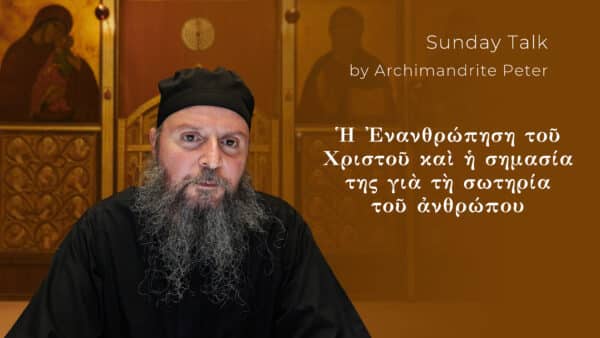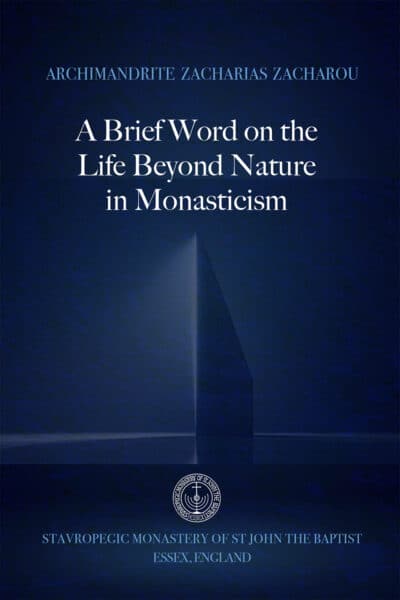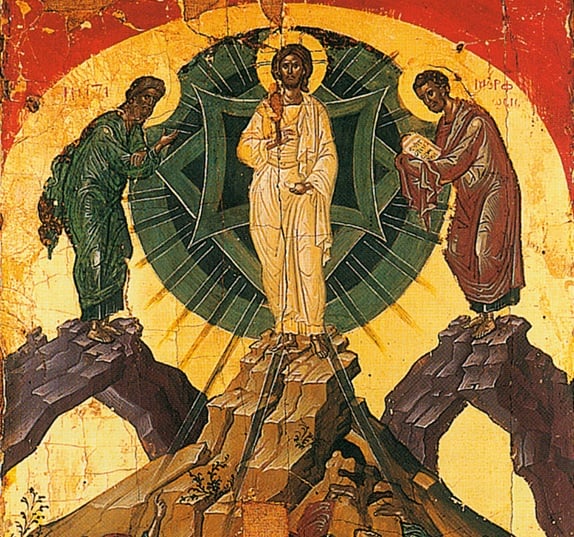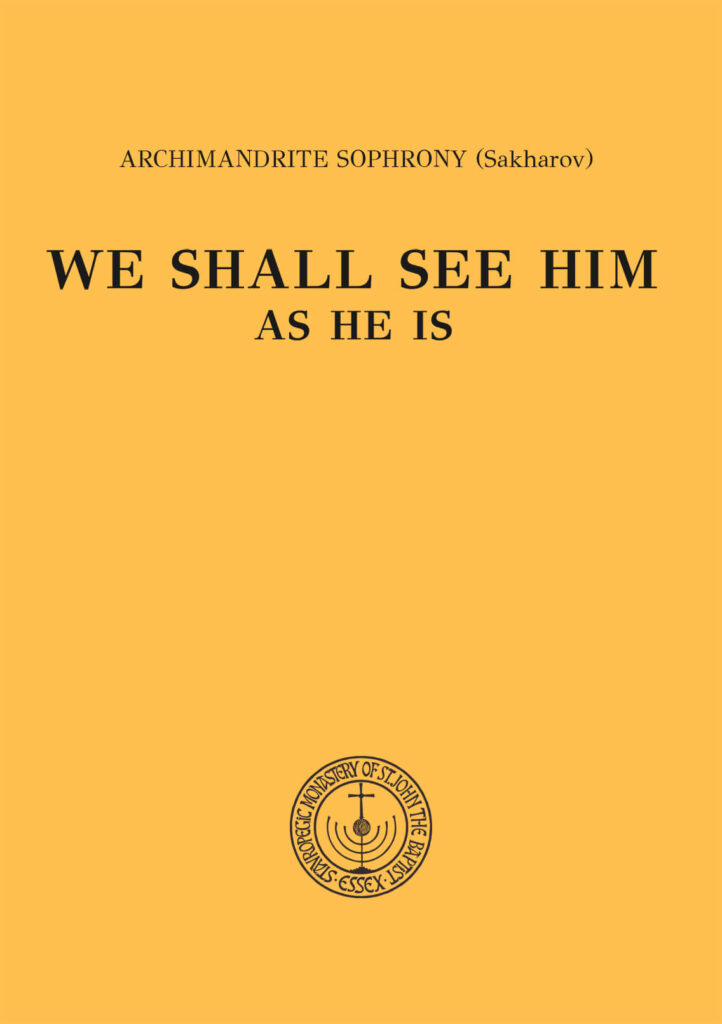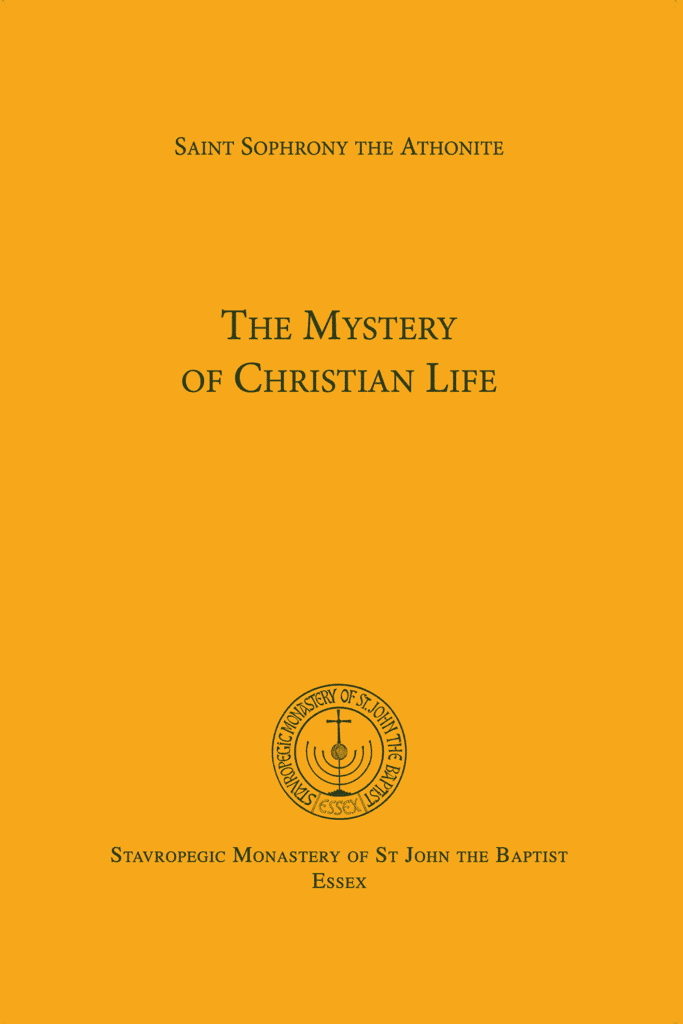The Feast of Transfiguration has a special word for our times, because it reveals to us the glory that God had foreordained for man from the beginning. This is very important because we are living in times when we experience a great degradation of man. People have lost their purpose and inspiration in life, and this feast comes to give us the way out of this impasse.
Soon after Saint Peter confessed the divinity of the Lord, Christ said: ‘There are some here among you who will not taste of death until they see the Kingdom of God coming in power.’1See Matt. 16:16, 28. ‘The Kingdom of God coming in power’ was the event of Transfiguration that followed. Father Sophrony comments that Peter’s witness showed that the disciples had increased in faith and love for Christ, and this made them fit to receive His revelation on Tabor.2See We Shall See Him as He Is , trans. Rosemary Edmonds, (Tolleshunt Knights, Essex: Stavropegic Monastery of St John the Baptist, 2004), p. 157.
We Shall See Him as He Is
Father Sophrony also explains that the character of Christ’s prayer on Tabor was similar to His prayer in Gethsemane,3See The Mystery of Christian Life, (Tolleshunt Knights, Essex: Stavropegic Monastery of St John the Baptist, 2023), p. 221. and it is in the fervency of this prayer that He was transfigured before the disciples. Therefore, not only the faith and love of the disciples, but more importantly, the prayer of Christ opened their eyes to see His glory so that when later they would see Him crucified, they might not despair utterly. The Gospel says that ‘a bright cloud overshadowed them’, and Father Sophrony explains that this was the light and the breath of the Holy Spirit. Then the voice of the Father was heard out of the cloud, and this was the climax of the revelation.
The Mystery of Christian Life
In a way, Transfiguration is a feast of prayer. It is a feast very dear to hesychasts because it celebrates prayer. Those who dedicate their life to standing in the presence of God with the mind in the heart, enter in communion with God’s grace, which they often experience as Light. Moses and Elijah appeared on Tabor, because Christ was present, the fulness of the law and the prophets, which they represented.
Archimandrite Zacharias: Father Sophrony sometimes underlined that we receive a great lesson from the icon of the Transfiguration. We see Christ in the middle and Moses and Elijah, who represent the Old Covenant, standing beside Him and bowing as servants. Christ stands in the middle as the Almighty God, as the unique Source of every revelation, as the centre of the message of all sacred history from the beginning of the world to the end of time. In Him, the Old Testament is united with the New, because in both Covenants, He is the unique Author of every revelation as the Word of God.]
But Moses and Elijah also appeared on Tabor because throughout their life, they even quarrelled with God, constantly seeking to understand His judgments. When Moses asked God to make Himself manifest to him on Sinai, God fulfilled his wish and allowed him to see only His ‘back parts’.4See Exod. 33:12-23. Sinai was covered with a dark cloud, whereas today we see Tabor covered with a bright cloud, showing that this Theophany was far greater than any revelation of the Old Testament. Elijah walked for forty days in prayer to Horeb, where God made Himself manifest to him in the ‘still small voice’.51 Kgs. 19:12. Having learned to converse with God in this life, prayer accompanied the two prophets in eternity, and we now see them on Tabor standing beside the Word of God, conversing with Him Face to face, like Adam before the Fall.
Therefore, the feast of Transfiguration teaches us that what we expect in eternity begins from this life: if we do not acquire experience of standing in the presence of God and conversing with Him from this life, it is not sure that we will have this experience in eternity. Father Sophrony expresses this more explicitly: ‘If I do not change myself from this life and become like unto God, how can I expect to be with Him for ever?’
The mystery of Transfiguration is always at work in the Church, as Christ is constantly transfigured before us. We have three main means to enter the presence of God: His Name, His word and the Divine Liturgy. Invoking the Name of Christ continuously is a laborious task, but sometimes it is as if Christ opens the eyes of our heart, and we feel the power of divine life contained in His Name. Then we stand in His divine presence, which cleanses, illumines and sanctifies us. Saint Silouan called upon the Name of Christ before His icon, and in its place, he saw the Living Christ.
We often read the words of Scripture, but there comes a moment when one of these words is transfigured before us, revealing all the mystery of God and all our fallenness, opening rivers of waters flowing from our eyes. On the way to Emmaus, Christ opened the eyes of Luke and Cleopas to understand the Scriptures with a burning heart. Elder Charalambos said that every time he celebrated the Liturgy, he grasped a different aspect of it. Indeed, the mystery of Christ is infinite, and we can never grasp it wholly.
On Tabor, Christ first shone as the sun, and the disciples saw Him as flesh; but when the cloud overshadowed them, they saw Him as a spirit: they passed from the physical and human to the spiritual and divine. Likewise, it is not enough to say we believe; in our approach to the mystery of Christ, we must also experience from this life the passage from the flesh to the spirit, from the human to the divine.
And if a ‘rich entry into the Kingdom’6Cf. 2 Pet. 1:11. is offered to us in this life, why would we not stretch forth to grasp it? We should not draw back with false humility, thinking that we are unworthy, for the troparion of the feast says: ‘Let Thy light shine forth also upon us sinners.’ We will have true humility and true repentance when we see the true dimensions of our calling and perceive how far we have fallen from it. God planted in our soul the desire to seek for Him, and it is therefore natural for man to seek for something ‘other’ than what his physical eyes can see. This ‘otherness’ is given to him in the communion of grace whereby he is vested with the majestic glory of God, with the garment of godliness,7See Ps. 92:1 (LXX). which is the Light of Tabor.
During His sojourn in the flesh, many could see Christ with their eyes, but few were those who could see the glory He bore within. Among them, first and foremost was the Mother of God. When Saint John the Baptist was baptising in the Jordan, he was the only one who could see this glory in Christ: ‘Behold the Lamb of God.’8John 1:29. He perceived the judgment of God in this glory, that Christ had come to take upon Him the sin of the world. Peter, James and John were also vouchsafed to behold this glory on Tabor. Until today in every generation, few are those who see the glory of Transfiguration like the disciples; and maybe even fewer are those who also hear the voice of God. Through their prayer, these few become a leaven which ‘leaveneth the whole lump’,91 Cor. 5:6. the whole world.
In the light of Tabor, man becomes a mediator between God and his fellows, a royal priesthood, ministering to his own reconciliation with God, but also to the salvation of the whole world. In the Orthodox Church, there is an unbroken chain of Tradition of such holy Fathers who experienced the light of God. Many of us will perhaps never see this light of God; for He does not give His grace without discretion, knowing that we are poor traitors. It is not by chance that we sing the Katavasias of the Cross at Transfiguration. For it is through the Cross that the light of Tabor becomes our eternal possession. God the Father says, ‘This is my beloved Son, in Whom I am well pleased; hear ye Him,’10Matt. 17:5. meaning, ‘Be obedient to Him.’ But wherever there is obedience to a divine commandment, the mystery of the Cross is also at work.
Thus, we are called to hear Him, that is, to follow Him in His journey from Tabor to Golgotha. Indeed, the light of Tabor is a complete crucifixion for him who experiences it.
Question: Is the cloud of light an apophatic description of the manifestation of the glory of God?
Archimandrite Peter: Yes, it is apophatic, but it bears a cataphatic content. Saint Paul heard ‘unspeakable words’, but he did hear them. We often read in the holy Fathers that they saw a light that is ‘beyond light’, because there is no earthly term that can describe the uncreated energy of God. Saint Maximus the Confessor says that man experiences the Sabbath when he enters the presence of God; but there is also ‘the Sabbath of Sabbaths’. Likewise, Abba Ammonas describes Prophet Elijah’s ascent to heaven, saying that in comparison with the light of each heaven he ascended to, the prophet felt the light of the heaven he had left behind as darkness. We even express this phenomenon in the way we build our churches. We pass from the porch into the nave, and then comes the sanctuary, to show this gradual pattern of revelation.
Question: When the Lord and His disciples descended from the mountain, were the crowds waiting for Him, because they realised that a great event had happened?
Archimandrite Peter: Someone once said that even the disciples had to come down from the mountain, to understand that Tabor was not the end, although Peter would have stayed there for ever if he could. One reason for which we see the crowds running to Christ in the Gospel, is that He mystically attracts them to Himself. It is possible that, having revealed to the disciples His pre-eternal glory on Tabor, the Lord wanted to turn their minds to the multitudes which they would serve later. Grace always leads to the service of others. Saint Silouan saw the glory of Christ, and then immediately his heart embraced the whole world: ‘I pray Thee, O merciful Lord, that all the peoples of the world [not only the Christians] might know Thee.’ ‘The crowds’ are the content of God’s mind, and when He gives His grace to His elect, inevitably, He appoints them to minister the weaker members. This is the inverted pyramid in our Church, where the strongest members serve the weak, after the example of Christ, Who ‘came not to be ministered unto, but to minister’11Matt. 20:28..
Question: How can I work on myself today to become a ready vessel for the uncreated Light?
Archimandrite Peter: We do not walk our spiritual path with such a target. Our main target is to be reconciled with God and to remove from our whole being every obstacle that prevents us from belonging to Him. Father Sophrony does not say that man is deified when he sees the Light of God, but when the commandment of Christ becomes the unique law of his existence. Saint Symeon the New Theologian, who had a very great and rare experience of the Uncreated Light, says that God will not give us such an experience because we prepare or because we fast; He gives it to those who are lowly in spirit. Even when the Light covers those who have true humility, they do not turn their attention to it, because they bear in their heart a very deep wound of love for the Giver of all good. In a beautiful article on the Transfiguration of Christ, Father Zacharias uses the example of Saint Silouan to show that when the Light of God is revealed to man, from love for God he becomes like one who has lost his wits. He can no longer turn his mind to anything of this world but is constantly possessed by the thought of God, because ‘love is the end of the law.’12Cf. Rom. 10:4.
Question: When Christ was born into this world, when did He become aware that He was the Son of God?
Archimandrite Peter: When the Mother of God visited Elisabeth, Saint John the Baptist ‘leaped for joy’ in the womb of his mother, recognising the Messiah in the womb of the Holy Virgin.13Cf. Luke 1:41, 44. Consequently, it is not possible for Christ ever to be unaware of His Divinity. David says that He came into this world with one intent: ‘Lo, I come to do Thy will, O God.’14Cf. Ps. 40:7-8. And Isaiah perceived Him with his clear and prophetic eye, saying that, from the moment He was born, before discerning between good and evil, He opted for good in a perfect and absolute way15See Isa. 7:15 (LXX).. Moreover, living on this earth, Christ was perfect at every age. He was not a monstrous being that manifested the wisdom of an adult at an infant age, as the Messiah and the Son of God. He was a perfect child as a one-year-old, as a twelve-year-old child, when we see Him teaching in the synagogue,16See Luke 2:42-47. and He was a perfect Man at the age of thirty when He began His public ministry. Having one divine Hypostasis, the Lord was perfect God and perfect Man at every stage.
Question: How can we acquire the ethos of God?
Archimandrite Peter: To acquire the ethos of God we need communion with the grace of God. When hesychasts continued in pure prayer, their heart was enlarged; the properties of God were transmitted to them: humility, love, meekness, and the will of God that all may be saved became their will also. This is how they acquired the ethos of Christ and began to intercede for the salvation of the whole world. The most perfect example is Saint Peter. What was the first thing he did after he received the fiery tongue of the Comforter? He turned to the crowd and said: ‘Brethren, the promise is unto you.’17Acts 2:39. He was not self-sufficient but immediately turned to the others. This is the ethos of God. If we truly receive grace from God, it will show in our contact with our fellows: the second commandment reveals whether we have kept the first.
Question: What if we fear to lose the grace we received? What is the role of this fear?
Archimandrite Peter: Fear of God is a protective gift. Knowing that we are weak and fallen, our fear is not to offend Him with our vileness and our abomination, not to grieve His Spirit with our life, our thoughts, our behaviour, our words. Saint John the Divine and Saint Anthony the Great could say, ‘I no longer fear God because I love Him;’ ‘Love casteth out fear,’181 John 4:18. but the way to divine love passes through the fear of God. Fear of losing grace may indeed show imperfection because we have not known Him as our Father. The three children were threatened to be thrown in the furnace in Babylon, but they said to the King Nebuchadnezzar: ‘Our God Whom we serve is able to deliver us, and He will deliver us. But even if He does not defend us, we will not serve thy gods, nor worship the golden image which thou hast set up.’19See Dan. 3:13-18. Such is the love that casts out fear: then, whether we live or die, our heart belongs to Him and loves Him unto death. When man comes to know God as his Father, he surrenders his life to Him completely.
Question: How is it possible that a tiny person can come to see the uncreated Light and how can this person continue to live a ‘normal’ life after this event? Will this person need more direction?
Archimandrite Peter: God said, ‘Take heed that ye despise not one of these little ones,’20Matt. 18:10. because this is how He is Himself. He does not despise especially the little ones. Father Sophrony often quoted the verse: ‘This poor man cried, and the Lord heard him,’21Ps. 34:6. referring to himself, whom God did not despise. God grants the vision of the uncreated Light to those who will receive the gift and respond properly, so that it will be unto their sanctification and the salvation of many others around them. Surely, one needs to seek for guidance after receiving such a gift. Without spiritual guidance from someone who possesses knowledge of this experience, man’s path is arduous. Saint Silouan had no Elder to confirm his experience, yet he made it being directly taught by the Lord. However, as Father Sophrony states, many did not make it and some even lost their mind. If they received the grace of the perfect in the beginning and then they do not have guidance, they do not know how to live, because they do not know the ways of God’s salvation. Saint Simeon the New Theologian says, that surely, prayer is the way that leads to the experience of the light of Transfiguration. But prayer is not enough. Man also needs to find a spiritual guide and submit himself to him in obedience, because even if the spiritual father is unworthy, it is always better to be a disciple, than to be self-ruled.
Footnotes
- 1See Matt. 16:16, 28.
- 2See We Shall See Him as He Is , trans. Rosemary Edmonds, (Tolleshunt Knights, Essex: Stavropegic Monastery of St John the Baptist, 2004), p. 157.
- 3See The Mystery of Christian Life, (Tolleshunt Knights, Essex: Stavropegic Monastery of St John the Baptist, 2023), p. 221.
- 4See Exod. 33:12-23.
- 51 Kgs. 19:12.
- 6Cf. 2 Pet. 1:11.
- 7See Ps. 92:1 (LXX).
- 8John 1:29.
- 91 Cor. 5:6.
- 10Matt. 17:5.
- 11Matt. 20:28.
- 12Cf. Rom. 10:4.
- 13Cf. Luke 1:41, 44.
- 14Cf. Ps. 40:7-8.
- 15See Isa. 7:15 (LXX).
- 16See Luke 2:42-47.
- 17Acts 2:39.
- 181 John 4:18.
- 19See Dan. 3:13-18.
- 20Matt. 18:10.
- 21Ps. 34:6.
